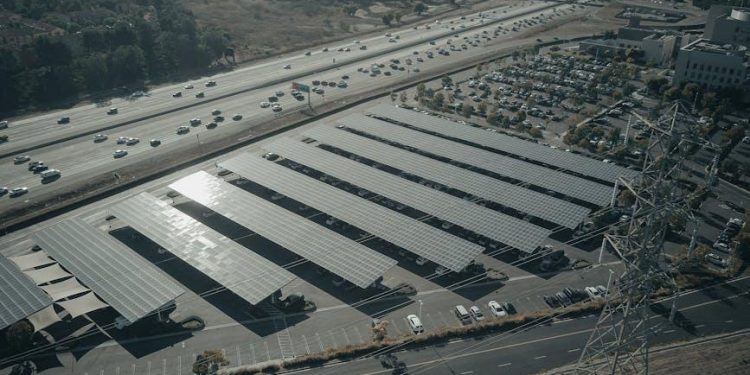In an era where the sun never sets on the global marketplace, businesses are turning their gaze upwards to harness a source of energy as old as time itself. Commercial solar power, once a niche investment for the environmentally conscious, is now emerging as a beacon of innovation and sustainability for industries worldwide. As companies grapple with rising energy costs and the urgent call to reduce carbon footprints, the solar revolution offers not just a solution, but a transformative shift in how businesses perceive and utilize energy. This article delves into the compelling reasons why commercial solar is poised to become the cornerstone of business energy strategies, illuminating a path towards a more sustainable and economically viable future.
Harnessing the Sun: The Economic Benefits of Commercial Solar Solutions
In today’s fast-paced business environment, the shift towards renewable energy sources is not just an environmental imperative but an economic strategy. Commercial solar solutions offer businesses a remarkable opportunity to reduce operational costs and enhance energy independence. By leveraging solar power, companies can significantly cut down on electricity expenses, often one of the largest overhead costs. With the potential to generate surplus energy, businesses can even benefit from energy credits or sell back to the grid, turning an essential utility into a revenue stream.
Moreover, investing in solar energy can improve a company’s brand image and attract environmentally conscious customers and investors. The initial investment in solar infrastructure is offset by the long-term savings and incentives offered by governments worldwide. Key economic benefits include:
- Reduced energy bills and operational costs
- Potential for additional revenue through energy credits
- Increased property value and attractiveness to investors
- Eligibility for tax incentives and rebates
As businesses continue to seek competitive advantages, embracing solar solutions represents not just an investment in sustainability but a strategic financial decision.

Innovative Technology: How Solar Energy Advances Are Transforming Business Operations
The landscape of business energy is being reshaped by the groundbreaking strides in solar technology. Companies are harnessing these advancements to not only reduce their carbon footprint but also to optimize their operational efficiency. Solar panels have evolved from bulky installations to sleek, efficient systems that can be seamlessly integrated into existing infrastructures. Businesses are now able to generate their own electricity, often producing more than they consume, which allows for a reduction in energy costs and a boost in sustainability credentials.
- Cost Savings: With solar energy, businesses can significantly cut down on electricity bills and potentially earn through surplus energy generation.
- Energy Independence: Solar advancements provide companies with the ability to become less reliant on fluctuating energy markets.
- Environmental Impact: Reducing carbon emissions through solar power aligns with global sustainability goals and enhances corporate responsibility.
Moreover, innovations such as solar batteries and smart grid systems are enabling businesses to store excess energy and use it during peak demand periods, further optimizing energy management. These technologies not only enhance operational resilience but also offer a compelling proposition for businesses aiming to future-proof their energy strategies in an increasingly eco-conscious market.

Sustainability and Beyond: Environmental Impacts of Adopting Solar Power
As businesses pivot towards greener practices, the shift to solar power emerges not just as a trend, but as a sustainable revolution. By harnessing the sun’s energy, companies are not only reducing their carbon footprint but also paving the way for a cleaner, more responsible future. The environmental benefits are vast and varied:
- Reduction in Greenhouse Gas Emissions: Solar power significantly cuts down on harmful emissions, playing a crucial role in combating climate change.
- Decrease in Air Pollution: Unlike fossil fuels, solar energy doesn’t release pollutants into the atmosphere, contributing to cleaner air quality.
- Conservation of Natural Resources: Utilizing solar reduces reliance on non-renewable resources, preserving them for future generations.
- Minimal Water Usage: Solar panels require little to no water to generate electricity, unlike conventional power plants, thus conserving this precious resource.
By integrating solar energy, businesses not only benefit the environment but also foster a culture of sustainability that resonates with increasingly eco-conscious consumers. In this way, adopting solar power becomes more than an environmental decision; it transforms into a strategic business move that supports a sustainable and prosperous future.
Strategic Implementation: Best Practices for Integrating Solar into Your Business Model
Integrating solar energy into your business model can be a transformative step towards sustainability and cost-efficiency. Strategic implementation is crucial to maximize the benefits of solar energy. Begin by conducting a comprehensive energy audit to understand your current energy consumption patterns and identify areas where solar power can make the most significant impact. Collaborate with solar energy experts to design a tailored solution that aligns with your business goals and operational needs.
Key best practices for successful solar integration include:
- Stakeholder Engagement: Involve key stakeholders early in the process to ensure alignment and support.
- Financial Planning: Explore financing options such as power purchase agreements (PPAs) and solar leases to manage upfront costs.
- Scalability: Design a system that can grow with your business, allowing for future expansions or technology upgrades.
- Monitoring and Maintenance: Implement a robust monitoring system to track performance and schedule regular maintenance to ensure optimal efficiency.
By embracing these best practices, businesses can seamlessly integrate solar energy, paving the way for a more sustainable and economically viable future.
In Summary
As we stand on the brink of a new energy era, commercial solar emerges not just as a choice, but as a beacon guiding businesses toward a sustainable and economically viable future. The sun, an ancient and constant force, now powers the engines of innovation and industry, casting light on pathways previously unimagined. In embracing solar energy, businesses are not merely adopting a technology; they are committing to a vision—a vision of resilience, efficiency, and environmental stewardship. As the landscape of business energy continues to evolve, the role of commercial solar will undoubtedly expand, illuminating the way forward for enterprises ready to harness its potential. The future of business energy is bright, and solar is its guiding star.


































